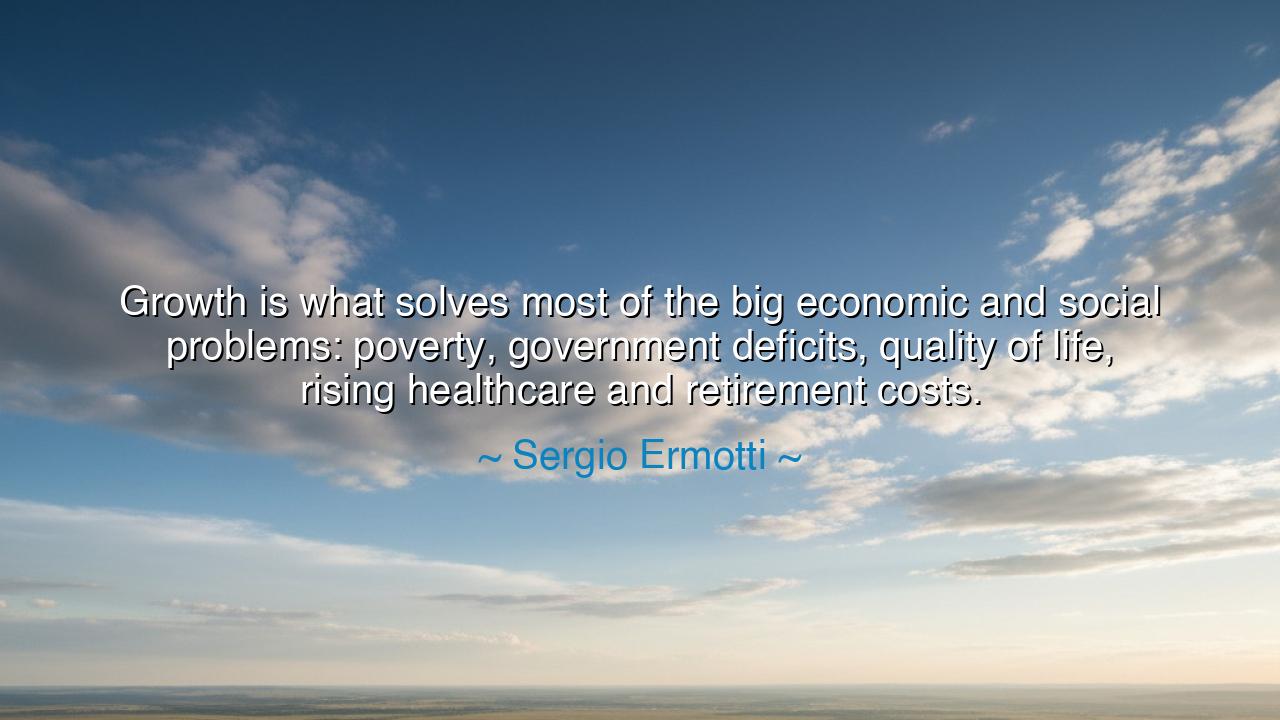
Growth is what solves most of the big economic and social
Growth is what solves most of the big economic and social problems: poverty, government deficits, quality of life, rising healthcare and retirement costs.






In an age when nations struggle under the weight of debt, inequality, and uncertainty, the financier and statesman Sergio Ermotti declared a truth that echoes across the ages:
"Growth is what solves most of the big economic and social problems: poverty, government deficits, quality of life, rising healthcare and retirement costs."
These words are not the boast of a banker nor the empty optimism of a politician — they are the distilled wisdom of experience. Ermotti, who rose from modest beginnings to lead UBS, one of the world’s great financial institutions, speaks of a law as ancient as civilization itself: that growth — the expansion of human capability, the flourishing of industry and innovation, the multiplication of opportunity — is the foundation upon which prosperity and peace are built. His words call to mind not mere financial increase, but the deeper growth of societies, where progress in work, science, and knowledge uplifts the dignity of mankind.
The meaning of this declaration reaches beyond the walls of commerce. Growth, in Ermotti’s vision, is the lifeblood of civilization — the current that carries humanity forward from scarcity to abundance, from despair to hope. When a nation grows, it creates more than wealth: it creates possibility. The poor find work; the government gathers resources to educate, to heal, to defend; the elderly are cared for by the strength of the young. Without growth, all efforts at reform collapse under the weight of stagnation. For poverty cannot be legislated away, deficits cannot be wished away, and the burdens of health and age cannot be endured without the engine of creation and productivity. Growth is not greed — it is the breath of progress.
The origin of this understanding lies deep in the story of human civilization. From the dawn of agriculture to the age of machines, every great leap forward began with the discovery of how to multiply the fruits of labor. When ancient Egypt learned to harness the Nile’s floods, its people no longer starved; when Athens expanded its trade and knowledge, philosophy and democracy were born; when America unleashed the power of industry and enterprise, it lifted millions from poverty and lit the world with invention. In each case, growth was not merely an economic fact — it was a moral triumph, a testament to human ingenuity and perseverance. Ermotti’s insight revives that ancient truth: that the advancement of the whole depends upon the advancement of each.
History also offers the counterexample — the shadow that falls when growth ceases. In the Great Depression of the 1930s, nations that once thrived sank into despair. Factories closed, families starved, and faith in the future withered. Political extremism grew where economies did not. From those ashes, the leaders of that era learned a lesson that has never faded: that economic vitality is the guardian of social peace. When people see their lives improving, they believe in the system that sustains them. But when stagnation rules, anger and division fester. Growth, therefore, is not merely about wealth — it is about stability, dignity, and the preservation of freedom itself.
Ermotti’s words also remind us that growth is not the enemy of compassion, but its ally. A rich society can afford to care for its poor; a strong economy can invest in healing and education. It is when growth falters that charity dries up and governments crumble beneath their debts. Thus, to pursue growth is to pursue the welfare of all — not through the redistribution of what exists, but through the creation of what does not yet exist. Innovation, enterprise, and courage are the tools of this creation. As the ancients might have said, the river of prosperity must keep flowing, or else it becomes a stagnant pool that breeds decay.
Yet Ermotti’s wisdom carries also a warning. Growth must be sustainable, guided by wisdom, justice, and foresight. For growth without morality becomes greed, and prosperity without balance breeds ruin. Just as a tree must be pruned to bear good fruit, so too must growth be directed toward the flourishing of humanity, not the exploitation of it. The ancients knew this: the wealth of a city meant nothing if its people lost their virtue. So too in our age, growth must be measured not only in numbers, but in the well-being of the human spirit — in fairness, opportunity, and the stewardship of the Earth that sustains us.
So let this teaching endure as both counsel and challenge: growth is the light that dispels the darkness of want. It is the foundation upon which liberty, equality, and peace can rest. But it does not come by chance — it comes by labor, by innovation, by courage, and by cooperation. Each person, from the humblest worker to the mightiest leader, must see their task as a contribution to the common ascent of humanity.
Thus ends the teaching: Let nations strive not merely to survive, but to grow — in industry, in wisdom, and in justice. For when growth is guided by virtue, it becomes more than prosperity; it becomes the unfolding of human destiny itself, the steady rise of civilization toward the light.






AAdministratorAdministrator
Welcome, honored guests. Please leave a comment, we will respond soon